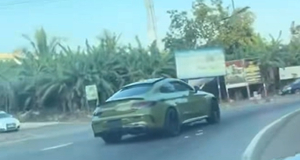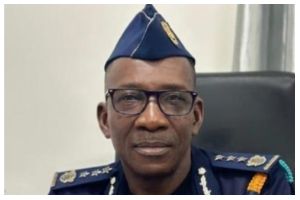. Vehicles, motorbikes queue at filling stations
Mr. Paul Tawiah Quaye, Inspector General of Police (IGP) The Ghana Police Service (GPS) has been hit by a major fuel shortage, which is likely to ground most of its operational vehicles and motorbikes in the next couple of days.
Most of these operational vehicles have now begun to join long queues at the various fuel stations across the length and breadth of the country, to buy petrol. Drivers and riders were told about a month ago that there was a fuel shortage when they went to the police workshop, which is closed, to draw fuel for use.
However, the authorities seem to have not to have found a solution to the situation, which is having a telling effect on these police drivers and dispatch riders.
Currently, most of these drivers, in whose care the vehicles have been entrusted, and riders of police motorbikes, are compelled by prevailing circumstances to use part of their already paltry salaries to buy fuel to keep their vehicles running each passing day.
Some of these drivers and riders who spoke to The Chronicle on condition of anonymity, said whenever they go to the police workshop, the officers in-charge are not able to give them any specific reason for the shortage.
That notwithstanding, they are also not able to tell what date and day they would receive some of the product.
Some of these drivers and motorbike riders told the paper that they are compelled by circumstances to spend over GH¢10 each day, since they buy at least between two to three gallons of fuel (petrol/premium) at a cost of GH¢5.50 per galoon, or Total Effimax, which cost GH¢6.20 per gallon from their own pockets.
In certain instances, they are compelled to buy over three gallons a day, when the schedule is tight.
There is however no indication that these policemen would be reimbursed for these expenses they make on fuel.
The Director of the Police Public Relations Unit, Deputy Superintendent of Police (DSP) Akwasi Ofori, though would not confirm that there was a shortage of the product at the police workshop, noted that the police service had decided to manage its expenditure on fuel, in order to reduce waste in the system. This was when the paper contacted him.
He denied that the police service had been hit by a fuel crisis, insisting that they were only managing the fuel.
Quite apart from that, he said there was enough fuel to run the police vehicles and motorbikes.
Some pump attendants at a couple of these fuel stations visited by the paper, confirmed the issue of some of these police drivers and riders purchasing fuel at their end.
General News of Thursday, 20 August 2009
Source: Charles Takyi - Boadu
Fuel shortage hits police service
Entertainment











